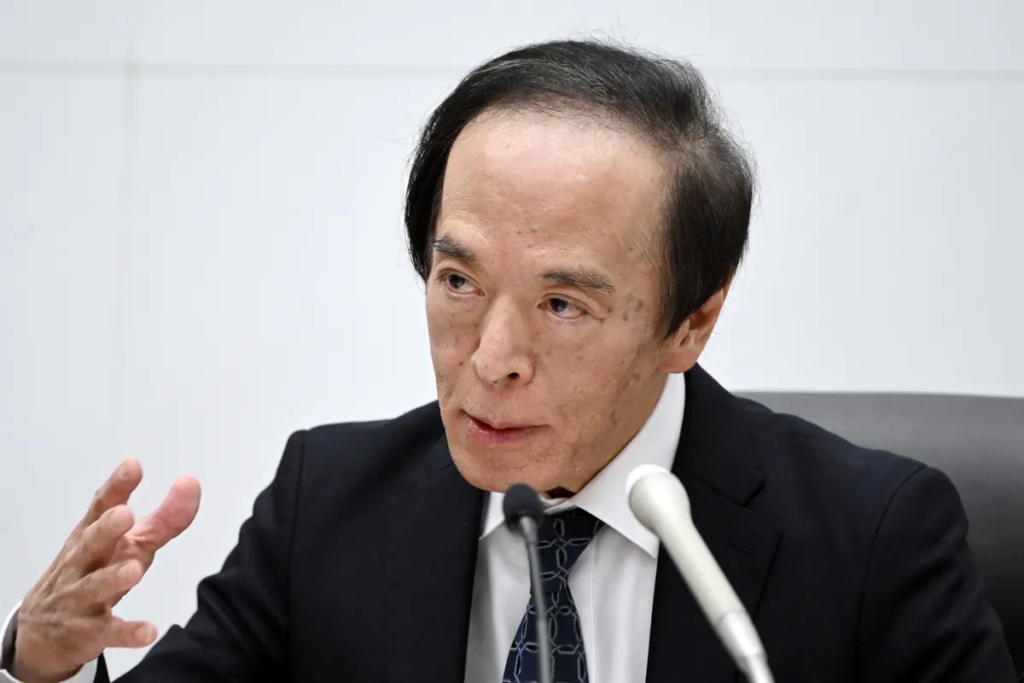- Yen appreciates by up to 1% on Ueda’s policy outlook comments
- The central bank remains cautious about the inflation outlook for fiscal 2025 and believes there are upside risks
The Bank of Japan kept its benchmark interest rate unchanged while sticking to its expected path to achieve its inflation target, a stance that suggests another round of rate hikes could come in the coming months.
Governor Kazuo Ueda reinforced that view at a news conference after the policy decision, saying that as long as Japan’s current political situation does not affect economic and price trends in line with the central bank’s expectations, it will not hinder the decision to raise interest rates further.

“Our basic stance is to raise rates if economic and price trends meet our expectations,” Ueda said, adding that since U.S. economic risks have substantially eased, it is no longer necessary to say the bank needs “time to think” before adjusting policy.
The yen strengthened as investors interpreted his comments as a hint of possible future interest rate hikes.
“Ueda is clearly paving the way for a rate hike,” said Nobuyasu Adago, chief economist at Rakuten Securities and a former Bank of Japan official. “Based on his comments today, the possibility of a rate hike in December has increased.”
Earlier, Ueda and other board members kept the unsecured overnight lending rate at around 0.25%, as widely expected by economists. The central bank’s decision to remain on hold has good reason to do so, given the many uncertainties facing the economy, including the outcome of the U.S. presidential election and the aftermath of August’s market turmoil.
In addition to the leadership battle between U.S. Vice President Kamala Harris and former President Trump, political uncertainty in Japan has also intensified after the ruling Liberal Democratic Party suffered its worst election result in 15 years over the weekend.

The outcome could weaken the government’s ability to maintain fiscal restraint while pushing ahead with economic measures. The central bank could come under pressure to slow the pace of rate hikes, depending on the type of deal Prime Minister Shigeru Ishiba needs to win support for his minority government.
“Personally, I don’t think this instability will stop the Bank of Japan from raising rates,” said Toru Suehiro, chief economist at Daiwa Securities.
Bloomberg Economists’ Views:
“Governor Ueda has tempered his cautious stance… He hinted that the upcoming meeting will be important. We think it will take a few more months for the BOJ to confirm that the situation is clear – perhaps with another rate hike in January.”
—Economist Taro Kimura
In its quarterly report, the central bank said it needed to pay attention to the direction of overseas economies, especially the US economy.
“We have been watching the downside risks of the U.S. and overseas economies, but that fog is gradually dissipating,” Ueda said. “Of course, the policies of the new U.S. president may bring new risks.”
Ueda made it clear that the Bank of Japan would respond to these risks if necessary, but would not wait too long to be prepared.
Influenced by Ueda’s remarks, the yen appreciated by as much as 1% to 151.92 against the dollar. As the market worried that the strengthening of the yen would affect export companies, the Japanese stock market fell slightly, with the Topix index closing down 0.3%. The 10-year government bond yield fell 1.5 basis points to 0.935%.

Investors, businesses and economists are now speculating whether the next move will come in December or January.
Bloomberg survey shows economists tend to expect a rate hike in December, while the overnight swap market still thinks January is more likely. The market currently expects a 69% chance of a rate hike before January, up from 63% on Wednesday.
The central bank went on to say that it expects the underlying inflation trend to remain consistent with its stable 2% target in the second half of its three-year forecast period to March 2027.
The central bank also maintained that there are upside risks to the price outlook for fiscal 2025. This shows that despite the current uncertainties, the central bank believes that the long-term trend is still on track and may strengthen further. The Bank of Japan also specifically mentioned the “clear” increase in nominal wages, showing that it is more confident in achieving a virtuous cycle of wages and inflation to maintain sustainable price growth.
Many BOJ watchers see the exchange rate as one of the factors influencing the timing of the central bank’s next policy move, as a further depreciation of the yen could add to inflationary pressures at a time when households are already struggling with rising living costs.
According to the median forecast of economists surveyed by Bloomberg, if the yen hits 155 against the dollar, Ishiba may express support for rate hikes. The current strength of the yen shows that the Bank of Japan’s message is basically appropriate.








